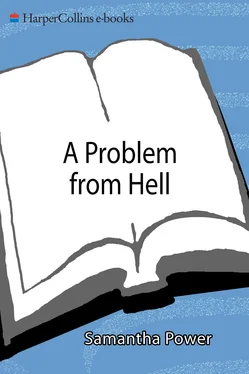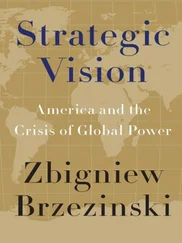1 ...6 7 8 10 11 12 ...16 men, fourteen to sixty years old, were driven to a single place, a square or a cemetery, where they were slaughtered or shot by machine guns or killed by hand grenades. They had to dig their own graves. Children in orphanages, inmates in old-age homes, the sick in hospital were shot, women were killed in the streets. In many towns the Jews were carried off to “an unknown destination” and killed in adja cent woods. 1
The Bund report introduced readers to the gas vans that roamed around the Polish town of Chelmno, gassing an average of 1,000 people every day (ninety per van) from the winter of 1941 to March 1942. The report revealed that Germany had set out to “exterminate all the Jews of Europe.” More than 700,000 Jews had already been killed; millions more were endangered. Its authors called upon the Polish government-in-exile to press the Allies to retaliate against German citizens in their countries. 2Others urged the Allies publicly to link their bombing of Germany to Nazi atrocities and to drop leaflets over German territory informing German citizens of the atrocities. Zygielbojm appeared on the BBC on June 26, 1942, to deliver the same message. Speaking in Yiddish, he read aloud a letter from a Jewish woman in one ghetto to her sister in another: “My hands are shaking. I cannot write. Our minutes are numbered. The Lord knows whether we shall see one another again. I write and weep. My children are whimpering. They want to live. We bless you. If you get no more letters from me you will know that we are no longer alive.” The Bund report and the woman’s letter, Zygielbojm said, were “a cry to the whole world.” 3
Earlier that year Jan Karski, a twenty-eight-year-old Polish diplomat and a Roman Catholic, had disguised himself as a Jew, donning an armband with the Star of David, and smuggled himself through a tunnel into the Warsaw ghetto. Posing as a Ukrainian militiaman, he also infiltrated Belzec, a Nazi death camp near the border between Poland and Ukraine. In late 1942 Karski escaped carrying hundreds of documents on miniature microfilm contained in the shaft of a key. He arranged to meet in London with Zygielbojm and his colleague, Ignacy Schwarzbart. On the eve of the meeting, Schwarzbart examined Karski’s documents, and, aghast, cabled the World Jewish Congress in New York, describing the suffering of the Jews in Poland:
JEWS IN POLAND ALMOST COMPLETELY ANNIHILATED STOP READ REPORTS DEPORTATION TEN THOUSAND JEWS FOR DEATH STOP IN BELZEC FORCED TO DIG THEIR OWN GRAVE MASS SUICIDE HUNDREDS CHILDREN THROWN ALIVE INTO GUTTERS DEATH CAMPS IN BELZEC TREBLINKA DISTRICT MALKINIA THOUSANDS DEAD NOT BURIED IN SOBIBOR DISTRICT WLODAWSKI MASS GRAVES MURDER PREGNANT WOMEN STOP JEWS NAKED DRAGGED INTO DEATH CHAMBERS GESTAPO MEN ASKED PAYMENT FOR QUICKER KILLING HUNTING FUGITIVES STOP THOUSANDS DAILY VICTIMS THROUGHOUT POLAND STOP BELIEVE THE UNBELIEVABLE STOP 4
Karski met with Schwarzbart and Zygielbojm the next day in their office near Piccadilly Circus. He told them of naked corpses in the Warsaw ghetto, yellow stars, starving children, Jew hunts, and the smell of burning flesh. Karski relayed a personal message to Zygielbojm from Leon Feiner, the leader of the Bund trapped in Warsaw. Feiner had instructed Zygielbojm to stop with the empty protests and urge retaliatory bombing, leafleting, and the execution of Germans in Allied hands. 5Karski said that when he had cautioned that the proposals were “bitter and unrealistic,” Feiner had countered with: “We don’t know what is realistic, or not realistic. We are dying here! Say it!” 6Karski, who had a photographic memory, recited Feiner’s parting appeal to Jewish leaders to do something dramatic to force people to believe the reports:
We are all dying here; let [the Jews in Allied countries] die too. Let them crowd the offices of Churchill, of all the important English and American leaders and agencies. Let them proclaim a fast before the doors of the mightiest, not retreating until they will believe us, until they will undertake some action to rescue those of our people who are still alive. Let them die a slow death while the world is looking on. This may shake the conscience of the world.
Upon hearing Feiner’s message, Zygielbojm leaped from his seat and began pacing back and forth across the room. “It is impossible,” he said, “utterly impossible. You know what would happen. They would simply bring in two policemen and have me dragged away to an institution…Do you think they will let me die a slow lingering death? Never…They would never let me die.” 7As he continued questioning Karski, an agitated Zygielbojm pleaded with his messenger to believe he had done all he could. Two weeks later in a BBC broadcast Zygielbojm declared, “It will actually be a shame to go on living, to belong to the human race, if steps are not taken to halt the greatest crime in history.” 8
Karski traveled to the United States and met with Supreme Court justice Felix Frankfurter, who graciously heard him out and then responded, “I don’t believe you.” When a stunned Karski protested, Frankfurter interrupted him and explained, “I do not mean that you are lying. I simply said I cannot believe you.” 9Frankfurter literally could not conceive of the atrocities Karski was describing. He was not alone. Isaiah Berlin, who worked at the British embassy in Washington from 1942, saw only a massive pogrom. So, too, did Nahum Goldman, Chaim Weizmann, David Ben-Gurion, and other leading Zionists. 10
The Germans did their part, issuing ritual denials and cloaking the Final Solution in the euphemisms of “resettlement.” Joseph Goebbels, Hitler’s minister of propaganda and national enlightenment, met atrocity reports by pointing to British abuses carried out in India and elsewhere, a tactic he deemed “our best chance of getting away from the embarrassing subject of the Jews.” 11The Swiss-based International Committee of the Red Cross (ICRC), which documented the deportations, did not publicly protest because, it concluded, “public protests are not only ineffectual but are apt to produce a stiffening of the indicted country’s attitude with regard to Committee, even the rupture of relations with it.” 12Intervention would be futile and would jeopardize the organization’s ability to conduct prison inspections, deliver humanitarian parcels, and transmit messages among family members. Neutrality was paramount.
The Allies’ suppression of the truth about Hitler’s Final Solution has been the subject of a great deal of historical scholarship. 13Intelligence on Hitler’s extermination was plentiful in both classified and open sources. The United States maintained embassies in Berlin until December 1941, in Budapest and Bucharest until January 1942, and in Vichy France until late 1942. 14The British used sophisticated decryption technology to intercept German communications. The major Jewish organizations had representatives in Geneva who relayed vivid and numerous refugee reports through Stephen Wise, the president of the World Jewish Congress (WJC), and others. In July 1942, Gerhard Riegner, the WJC Geneva representative, informed the State Department of a well-placed German industrialist’s report that Hitler had ordered the extermination of European Jewry by gassing. In November 1942, Rabbi Wise, who knew President Roosevelt personally, told a Washington press conference that he and the State Department had reliable information that some 2 million Jews had already been murdered. The Polish government-in-exile was a goldmine of information. Already by the fall of 1942, for instance, Zygielbojm had begun meeting regularly with Arthur J. Goldberg, General Bill Donovan’s special assistant at the Office of Strategic Services (OSS), to discuss the death camps.
But the intelligence was often played down. In June 1942, for instance, the London Daily Telegraph published the Bund report’s claim that 700,000 Polish Jews and more than 1 million Jews throughout Europe had been killed. The New York Times picked up the Telegraph ’s reports but buried them deep inside the paper. 15When Riegner cabled word of Hitler’s plot the following month, British and U.S. officials and journalists were skeptical about the veracity of “unsubstantiated information.” In the words of one Swiss foreign editor, “We received no picture of photographic exactitude, only silhouettes.” 16In 1944, when John Pehle, the director of Roosevelt’s War Refugee Board, wanted to publish the report of two Auschwitz escapees, Elmer Davis, the head of the U.S. Office of War Information, turned down his request. The American public would not believe such wild stories, he said, and Europeans would be so demoralized by them that their resistance would crumble. The U.S. ambassador to Sweden, Hershel Johnson, sent a cable in April 1943 detailing the extermination of Jews in Warsaw, but he ended his message by noting: “So fantastic is the story…that I hesitate to make it the subject of an official report.” 17In the November 1943 Stalin-Roosevelt-Churchill declaration, reference to the gas chambers was deleted because the evidence was deemed untrustworthy. To paraphrase Walter Laqueur, a pioneer in the study of the Allies’ response to the Holocaust, although many people thought that the Jews were no longer alive, they did not necessarily believe they were dead. 18
Читать дальше












